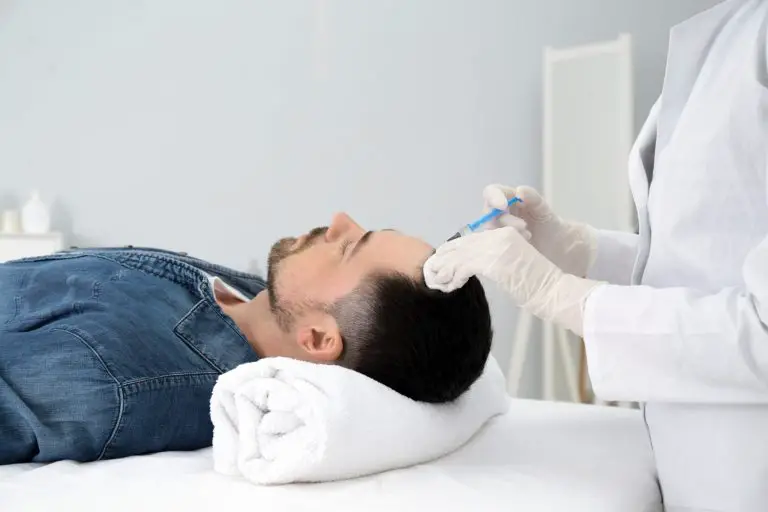
Page Contents
A lot of people are often startled when they first start to notice that their hairline is receding. While this is not an unusual reaction, here’s a complete guide to what baldness is, its causes, and possible ways out of the condition.
What causes baldness in men?
In most men, baldness is caused by a hereditary condition referred to as androgenetic alopecia. This condition is also more commonly referred to as male pattern baldness. Based on information from the American Hair Loss Association, 95 percent of hair loss in men is usually due to androgenetic alopecia.
However, the condition, which is mainly inherited, is basically as a result of sensitivity to a by-product of the hormone testosterone, dihydrotestosterone (DHT).
You are probably wondering how the hormonal by-product DHT causes hair loss. Well, here’s how
There are certain hair follicles that are sensitive to DHT. These hair follicles tend to shrink over time. As the hair follicles keep getting smaller, the lifespan of the hair in this region keeps reducing. Ultimately, the affected hair follicle soon stops producing hair totally.
In men, this baldness tends to follow a pattern. The most common patterns of hair loss include:
The hair starts thinning on the top of the head and around the temples, which may eventually lead to a horseshoe pattern of hair around the sides and back of the head.
The other pattern is that the hair begins to recede from the front of the hairline, pushing the hairline backward.
The extent and progression of balding in men are used to assess the severity and pattern of hair loss and balding.

At what age do men start losing hair?
Once you begin to notice that your hair is getting thinner than before, you don’t have to panic. Male pattern baldness has been shown to affect most men at one stage in their lives.
As a matter of fact, the American Hair Loss Association currently approximates that 25 percent of men with hereditary male pattern baldness starts to lose their hair before 21. By 35, about 66 percent of men would have experienced some extent of hair loss, and at 50 years, about 85 percent of men would have thinner hair.
Other causes of hair loss in men
While the primary cause of male pattern baldness in men is androgenetic alopecia, it is not the only condition that can lead to hair loss in men.
The major symptom of male pattern baldness is thinning hair. However, with other causes of hair loss, there is a possibility that you would notice other symptoms. Also, unlike in male pattern baldness, most other causes of baldness do not have any predictable pattern in hair loss. For other causes of hair loss, the hair loss is more likely to happen all over or only in a few spots.
Some of these other causes of hair loss might also lead to permanent or reversible hair loss. Some of the other common causes of hair loss include:
Alopecia areata
This is the condition whereby the body’s immune system begins to attack the hair follicles, thereby leading to hair loss. The hair hall out in small patches, although there’s a chance that it can also affect other parts of the body.
Hair loss can also occur as a sequel to a major shock or stressful event. This hair loss may be triggered by illnesses, weight loss, surgery, or even weight loss. Although, the hair grows back within 2 to 6 months.
There are certain nutrients that are essential for overall good health, including hair growth. Protein, Vitamin D, and several other essential vitamins in your diet are also important to keep healthy hair. Deficiency in any one of these nutrients can lead to a higher rate of hair loss than normal.
Medications that may cause hair loss
Also, there are certain medications that are temporary and can lead to hair loss. Once you are done with the medication, your hair would continue to grow normally. Some of these hair loss drugs include Chemotherapy drugs, antidepressants, some antifungal drugs, immunosuppressants, anticoagulants, acne medication, etc.
What are the most effective treatments?
In men, there are several approaches to treating hair loss. These treatment options range from creams and medications to more invasive treatments. Ultimately, choosing a treatment option largely depends on the cause of your hair loss and some other options.
Some of the most popular treatment options used in balding for men include;
Medications
In treating baldness in men, there are some prescription and over-the-counter drugs that have been approved for treating male pattern baldness.
The two medications that have been well established in the treatment or prevention of further male pattern hair loss are Finasteride, which is sold as Proscar, Propecia, and minoxidil, which is available as Ioniten, Rogaine. Finasteride comes in the form of a pill that is only available by prescription. Minoxidil can be obtained as an over the counter in most areas.
However, these treatments can up to six months before you begin to notice results.
Laser treatment
Another treatment option commonly used in hair loss is low-level laser therapy. This is used to improve circulation in the scalp and stimulate hair follicles. Although low-level laser therapy is relatively new in the treatment of hair loss, it has been shown to be safe and tolerable and much less invasive than hair transplant surgery.
Although there are limited studies on the use of laser therapy in hair growth, recent studies have shown appreciable results. Most people who had who have had laser surgery have shown positive results.
Hair transplant surgery
There are two common hair transplant procedures. These two procedures are the follicular unit extraction (FUE) and the follicular unit transplantation (FUT).
FUT involves removing a section of the skin from the back of the scalp where there is still hair growth. This part of the skin is then divided into hundreds of small pieces called grafts. These grafts are then placed in the areas where the hair isn’t growing.
With FUE, healthy hair follicles are taken out of the scalp, and small holes are made where the hair isn’t growing, and healthy follicles are put into the holes.
Related Reading
Can baldness be prevented?

In most instances, male pattern baldness is inherited. This is why it is difficult to non-surgically reverse hair loss due to this condition. However, once the first sing of thinning has been observed, preventing hair loss is impossible. Rogaine and Finasteride are two known treatments that can help prevent further hair loss, as is observed in androgenetic alopecia.
However, once you stop the medications, the hair loss may continue. This is why it is best to consult your Doctor before choosing a treatment option. Here are some tips to keep your hair healthy;
- Scalp massages help stimulate hair growth.
- Avoid smoking: Smoking has also been associated with hair loss.
- Manage stress with exercise, mediation, and deep breathing exercise.
- Ensure appropriate nutrition.
- Change medication: If you think your medication is causing hair loss, you should talk to your Doctor about possible alternatives.
In conclusion, baldness is mostly associated with genetics. So, if you are bald, it most likely due to your genes. Ninety-five percent of baldness cases are due to androgenetic alopecia. Men of all ages can be affected. And although it is not preventable, you can take steps to steps to slow down the hair loss.
But ultimately, if you are concerned about your losing hair, you should talk to your Doctor about finding the best treatment options.
Be sure to check out our list of the top 3 best hair thinning products.






